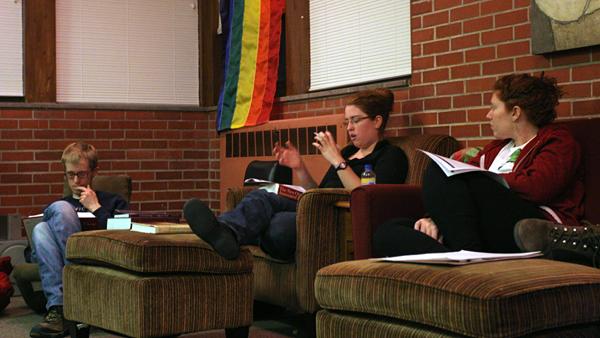
On Sunday Feb 22, in the Stonewall Resource Center, the Center for Religion, Spirituality, and Social Justice (CRSSJ) and the Stonewall Resource Center (SRC) held the first session of the CRSSJ/SRC Joint Bible Study Series, “The Bible, Sexuality, and Relationship.” The discussion focused on homosexuality in the Hebrew Bible.
Leah Krandel ’09 and Brian Perbix ’09 conceived of the Bible Study Series as a way to engage different Grinnell communities with an activity that would appeal to a wide range of students.
“The CRSSJ/SRC Bible Study was conceived very naturally through conversations with leaders at the SRC,” said Religious Life Intern Katie Snipes, who oversees the discussions with StoneCo leaders. “Since there have been collaborative Bible studies like this at Grinnell in the past, I wanted to reenter the conversation.”
According to Stonewall Coalition co-leader Jon Richardson ’10, around 20 students came to the group’s first discussion on Sunday, Feb 22 and attendance remained relatively steady for the second meeting this past Sunday, March 1. He said the participants came from a variety of backgrounds and faiths, including Jewish students, GCCF members, and both religious and
non-religious queer students.
“We spent time creating a safe space,” Snipes said. “Both religion and sexuality are intimate subjects, and it is vital to create the space for dialogue first.”
In a discussion about Sodom and Gomorrah, the group talked about the relationship between homosexuality and power in the Old Testament. Students eventually concluded that the distance between contemporary queer issues and the Old Testament means that the text cannot address questions of 21st century homosexuality.
Aside from education, the aim of the discussions is to foster a sense of understanding between the two groups, Richardson said. Rather than provoking a debate between students, the group hopes to share ideas and work through the text together.
According to Richardson, the group’s work is especially important in Grinnell, where the queer and religious communities are often unintentionally opposed. “A lot of queer people on campus feel rejected by Christianity, so that creates a kind of wariness toward someone who’s very Christian on this campus,” he said. “And someone who’s Christian might feel ostracized from the ‘mainstream’ Grinnell community. To demystify the notion of Christianity as an opposite value to Grinnell’s values is very cool.”
Richardson also said the discussions will aid queer students in defending themselves against homophobic attacks based on Christian texts. “Ultimately, after you leave this, you’re not going to really be convinced by someone with a banner that’s screaming hate speech at you,” he said. “You’re going to be a little more sophisticated in your argument and your knowledge of scripture.”
Brian Smith ’09, a leader of GCCF who also attended the workshop, said that he hoped the series would help clear general
misunderstandings about biblical scriptures’ basic messages in regards to issues of gender and sexuality. Smith said the first reading, which centered around biblical passages about Sodom and Gomorrah, showed how biblical scriptures’ meanings have deviated from what he believes is their true message.
“They were traditional stories in the Bible that people use to condemn homosexuality, but don’t say [that],” Smith said. “The stories are more about sex being used for oppression.”
The final discussion in the series will take place at 8 p.m. on Sunday, March 8 in the SRC, and will handle how to deal with contemporary “Christian” homophobia.
—Additional reporting by J. Francis Buse


















































